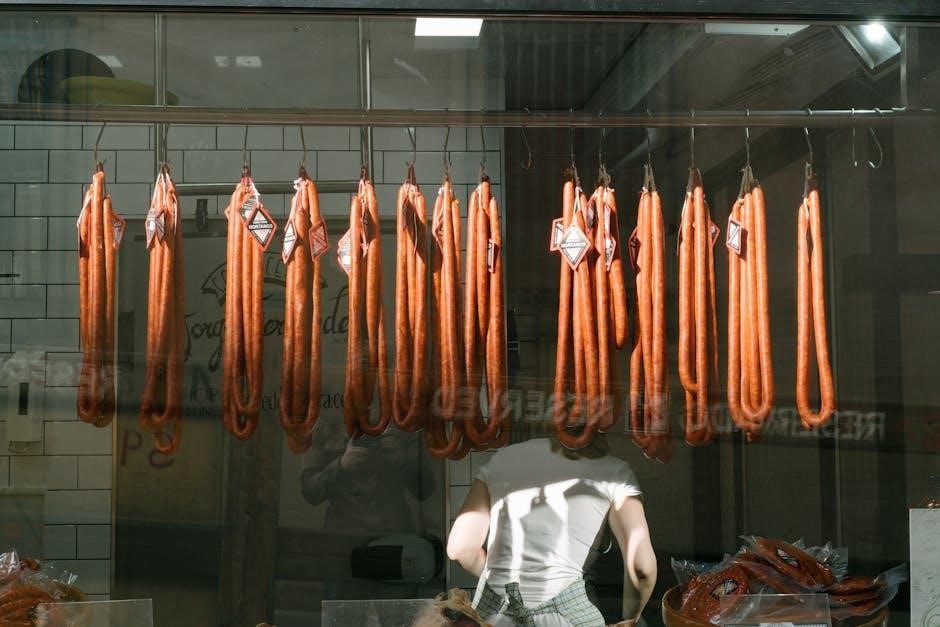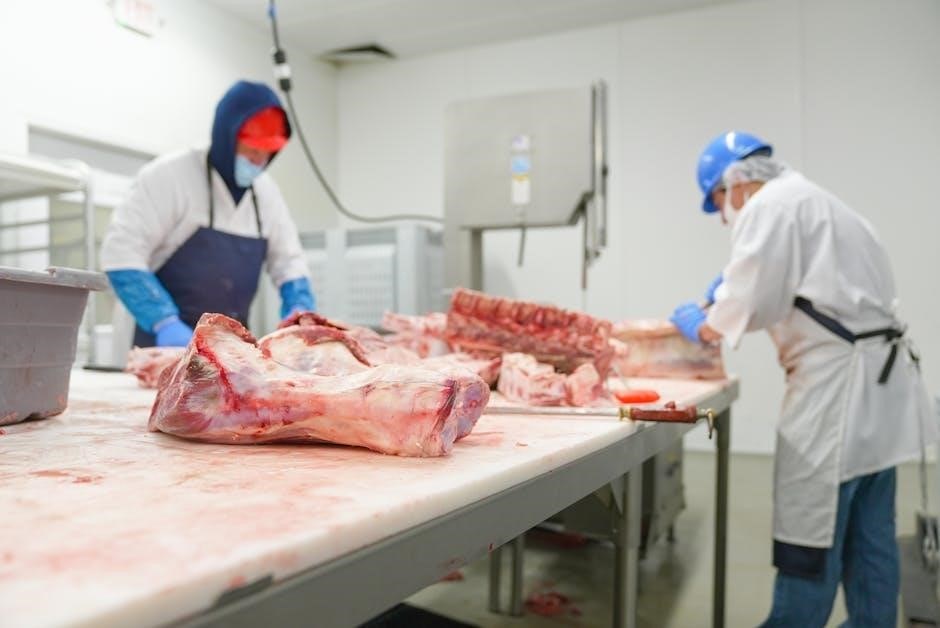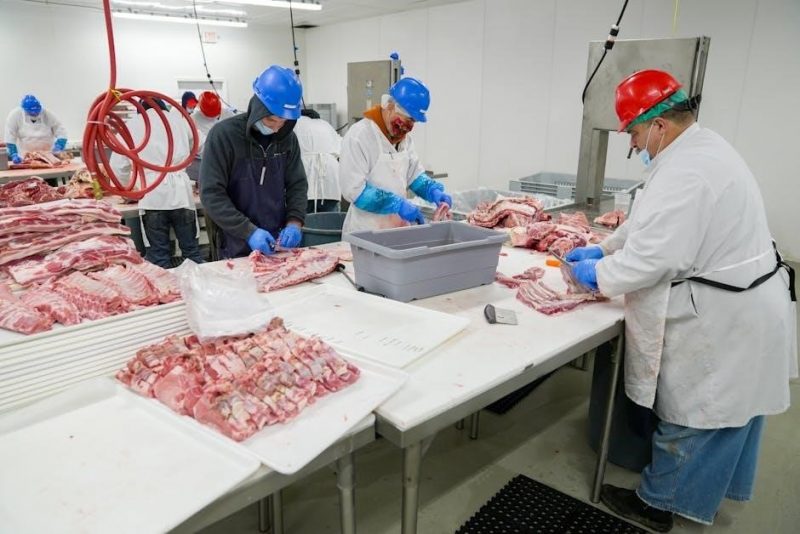meat industry award pay guide
Discover the latest Meat Industry Award pay rates for Australia. Updated 2023 guide with detailed salary insights. Check now!
The Meat Industry Award (MA000059) is a legal document outlining minimum wages, conditions, and entitlements for employees in Australia’s meat industry, ensuring fair and compliant employment practices.
1.1 Overview of the Award
The Meat Industry Award (MA000059) is a legally enforceable document that sets minimum pay rates, working conditions, and entitlements for employees in Australia’s meat industry. It applies to employers and employees nationwide, covering roles in processing, manufacturing, and related sectors. The award ensures fair wages, leave entitlements, and workplace protections, promoting equity and compliance across the industry.
1.2 Coverage and Application
The Meat Industry Award (MA000059) applies to employers and employees in the meat industry across Australia, including processing, manufacturing, and related sectors. It covers full-time, part-time, and casual workers, ensuring consistent pay rates and conditions. The award does not apply to certain employers in Western Australia unless they are incorporated and operate outside the state, as specified in the award’s coverage clause.
1.3 Importance of the Award in the Meat Industry
The Meat Industry Award (MA000059) is crucial for maintaining fair wages, consistent conditions, and legal compliance in the meat sector. It protects employees from wage theft and ensures employers meet minimum standards, fostering a balanced workplace environment. The award’s guidelines are essential for preventing disputes and promoting industry stability, aligning with the broader goals of Fair Work Australia to uphold worker rights and employer accountability.

Pay Rates Under the Meat Industry Award
Pay rates under the Meat Industry Award (MA000059) are determined annually, effective from 1 July each year, covering various job classifications and hourly rates to ensure compliance with minimum standards.
2.1 How Pay Rates Are Determined
Pay rates under the Meat Industry Award are determined through annual wage reviews by the Fair Work Commission, considering economic factors, industry needs, and employee welfare. These rates are then published in the official pay guide, ensuring transparency and compliance across all job classifications within the meat industry.
2.2 Current Pay Rates (Effective July 1, 2024)
The Meat Industry Award pay rates, effective from July 1, 2024, are outlined in the Fair Work pay guide. These rates include hourly and weekly pay for various classifications, ensuring fair compensation across the industry. Employers must refer to the official guide to ensure compliance with the updated pay scales, which reflect the latest adjustments from the Annual Wage Review.
2.3 Annual Wage Review and Adjustments
The Annual Wage Review by Fair Work Australia ensures pay rates in the Meat Industry Award are adjusted yearly to reflect economic conditions and cost of living. Adjustments, effective from July 1, 2024, aim to maintain fair wages and are outlined in the official pay guide. Employers must review and apply these updates to ensure compliance with current pay scales and avoid non-compliance issues.

Allowances and Loadings
The Meat Industry Award includes various allowances and loadings to compensate employees for specific work conditions. Key provisions include a 17.5% leave loading for annual leave and casual loading for casual employees, ensuring fair compensation for different employment arrangements and work-related expenses.
3.1 Types of Allowances
The Meat Industry Award provides various allowances to compensate employees for specific work-related expenses or conditions. These include meal allowances for working overtime, transportation allowances for travel requirements, tool allowances for employees providing their own tools, and attendance allowances for shift work. Additionally, a 17.5% leave loading is payable on annual leave. These allowances are adjusted annually to reflect cost-of-living changes, ensuring fair compensation for employees.
3.2 Leave Loading (17.5% Loading on Annual Leave)
The Meat Industry Award mandates a 17.5% leave loading on annual leave payments. This loading compensates employees for the loss of casual loading or other benefits during their leave. It ensures compliance with the Award and prevents underpayment, reflecting Fair Work’s commitment to fair employment standards and transparency in wage structures.
3.3 Casual Loading and Its Implications
Casual loading is a percentage added to casual employees’ pay to compensate for lack of benefits like sick leave or annual leave. Under the Meat Industry Award, casual loading is factored into base pay rates. Employers must ensure accurate calculations to avoid overpayments or underpayments. This provision ensures compliance with Fair Work regulations and protects both employees and employers from potential disputes or penalties. Proper understanding of these rules is essential for maintaining fair workplace practices and avoiding wage theft issues.

Employment Conditions
The Meat Industry Award outlines employment conditions, including types of work arrangements, hours, and breaks, ensuring fair treatment and compliance with workplace laws for all employees.
4.1 Types of Employment (Full-Time, Part-Time, Casual)
The Meat Industry Award distinguishes between full-time, part-time, and casual employment. Full-time employees work standard hours, part-time employees have set hours below full-time, and casuals are engaged as needed without guaranteed hours. Casual employees receive a loading to compensate for lack of leave entitlements, ensuring fair compensation across all employment types under the award.
4.2 Hours of Work and Breaks
Under the Meat Industry Award, standard full-time hours are 38 per week, with part-time and casual hours varying based on employment type. Employees are entitled to regular breaks, including meal breaks of 30–60 minutes and shorter rest periods. Specific rules apply to delayed meal breaks, which may affect pay rates. Compliance ensures fair work conditions for all employees in the meat industry.
4.3 Minimum Pay Rates and Superannuation
The Meat Industry Award sets minimum pay rates for employees, adjusted annually on July 1. These rates vary by job classification and experience. Employers must pay superannuation contributions, currently 10.5% of ordinary earnings, into eligible funds. Compliance with these requirements ensures fair compensation and adherence to Australia’s workplace laws. Accurate payment of wages and superannuation is essential for maintaining legal and ethical employment standards.

Leave Entitlements
The Meat Industry Award provides employees with entitlements to annual leave, sick leave, and public holidays. These entitlements ensure work-life balance and fair compensation during absences.
5.1 Annual Leave Provisions
Under the Meat Industry Award, employees are entitled to four weeks of paid annual leave per year. During this leave, they receive their ordinary pay rate plus a 17.5% leave loading. This ensures employees are fairly compensated while taking time off, promoting work-life balance and adhering to legal requirements.
5.2 Sick Leave and Other Leave Arrangements
Employees under the Meat Industry Award are entitled to paid sick leave, carer’s leave, and compassionate leave. Up to 10 days of paid sick leave per year is available for personal illness or injury. Additionally, unpaid leave may be granted for community service or other personal reasons. Casual employees are entitled to unpaid sick leave, ensuring fair treatment across employment types.
5.3 Public Holidays and Pay Entitlements
Employees under the Meat Industry Award are entitled to payment for public holidays or, if required to work, receive penalty rates. Public holiday pay is based on the ordinary hourly rate, with additional loadings for work performed on these days. This ensures fair compensation for employees who are required to work during designated public holidays.

Compliance and Enforcement
Compliance with the Meat Industry Award is enforced by Fair Work Australia, ensuring employers meet legal obligations. Non-compliance can lead to penalties and legal action, promoting fair workplace practices.
6.1 Role of Fair Work Australia
Fair Work Australia plays a crucial role in enforcing the Meat Industry Award, ensuring employers comply with minimum wages and conditions. They handle disputes, provide guidelines, and conduct audits to prevent wage theft. Their oversight ensures employees receive correct pay and entitlements, maintaining workplace fairness and accountability across the industry. This role is vital for upholding legal standards.
6.2 Preventing Wage Theft and Non-Compliance
Preventing wage theft and non-compliance involves accurate record-keeping, regular audits, and adherence to the Meat Industry Award. Employers must ensure correct pay rates, allowances, and leave entitlements. Fair Work Australia recommends using approved pay guides and tools to calculate wages, reducing errors. Transparency and education for both employers and employees are key to maintaining compliance and preventing underpayments in the industry.
6.3 Consequences of Non-Compliance
Non-compliance with the Meat Industry Award can result in significant penalties, including fines and legal action. Employers may face financial consequences, reputational damage, and mandatory back-payments to underpaid employees. Fair Work Australia actively monitors adherence to the award, and breaches can lead to audits and enforcement action to ensure employers meet their legal obligations and maintain fair workplace standards.
Overtime and Penalty Rates
Overtime and penalty rates under the Meat Industry Award ensure fair compensation for work beyond standard hours, with specific rates applying to weekends, public holidays, and overtime periods.

7.1 Overtime Pay Rates
Overtime pay rates under the Meat Industry Award are designed to compensate employees for work exceeding standard hours. For most classifications, overtime is paid at 1.5 times the ordinary rate for the first two hours and 2 times the ordinary rate thereafter. These rates apply to both full-time and part-time employees and are essential for maintaining fair workplace standards.
7.2 Penalty Rates for Specific Conditions
Penalty rates apply for work under specific conditions, such as weekends, nights, or public holidays, ensuring fair compensation for less desirable shifts. These rates vary based on the day and time, aligning with the Meat Industry Award’s standards to balance employer demands and employee fairness.
7.3 Public Holiday Penalty Rates
Public holiday penalty rates under the Meat Industry Award provide increased pay for work on designated holidays. Employees receive a percentage increase in their base rate, typically ranging between 150% to 250%, depending on the specific holiday and circumstances. These rates apply to both full-time and part-time workers, ensuring fair compensation for working on public holidays.

Recent Changes and Updates
The Meat Industry Award (MA000059) has seen updates, including the 2024 Annual Wage Review, which adjusted pay rates to reflect economic conditions. Fair Work Commission ensures compliance with these changes, impacting employers and employees across Australia’s meat industry.
8.1 Updates to the 2024 Pay Guide
The 2024 Pay Guide under the Meat Industry Award (MA000059) introduced revised pay rates effective from the first full pay period on or after 1 July 2024. These updates reflect the Annual Wage Review, ensuring rates align with current economic conditions. Employers must adhere to these changes to maintain compliance, with detailed adjustments outlined in the official Fair Work guide.
8.2 Impact of the Annual Wage Review
The Annual Wage Review significantly influenced the 2024 pay rates under the Meat Industry Award, with increases reflecting economic conditions and cost-of-living adjustments. These changes ensure fair wages for employees, while employers must adapt to maintain compliance. The review’s outcomes are detailed in the updated pay guide, emphasizing the importance of staying informed to avoid non-compliance issues and potential penalties.
8.3 Industry Response to Pay Rate Adjustments
The meat industry has shown a proactive response to pay rate adjustments, with employers focusing on compliance and accurate payroll management. Businesses are prioritizing wage theft prevention and aligning with Fair Work guidelines to ensure fair compensation. The adjustments have prompted closer scrutiny of payment systems, emphasizing transparency and adherence to the updated pay guide to maintain trust and regulatory compliance.

Resources for Employers and Employees
Employers and employees can access the official Meat Industry Award pay guide on the Fair Work website, along with tools for calculating pay rates and seeking further assistance.
9.1 Accessing the Official Pay Guide
The official Meat Industry Award pay guide can be accessed on the Fair Work Australia website. It provides detailed information on pay rates, allowances, and entitlements. Employers and employees can download the guide or view it online. The guide is updated annually to reflect changes in minimum wages and conditions. Visit Fair Work for the latest version.
9.2 Tools for Calculating Pay Rates
Fair Work Australia provides a pay rate calculator and detailed guides to help employers and employees determine correct pay rates under the Meat Industry Award. Online tools and downloadable spreadsheets are available to simplify calculations. These resources ensure compliance with minimum wage requirements, including overtime and penalty rates. Always refer to the official Fair Work website for the most accurate and updated tools to avoid errors in pay calculations.
9.3 Where to Seek Further Assistance
For detailed guidance, visit the Fair Work Australia website, which offers comprehensive resources, including the official pay guide and tools for calculating pay rates. Additionally, the Fair Work Infoline provides direct support for employers and employees. Contact them via phone or email for personalized assistance with interpreting the Meat Industry Award and ensuring compliance with its provisions.

